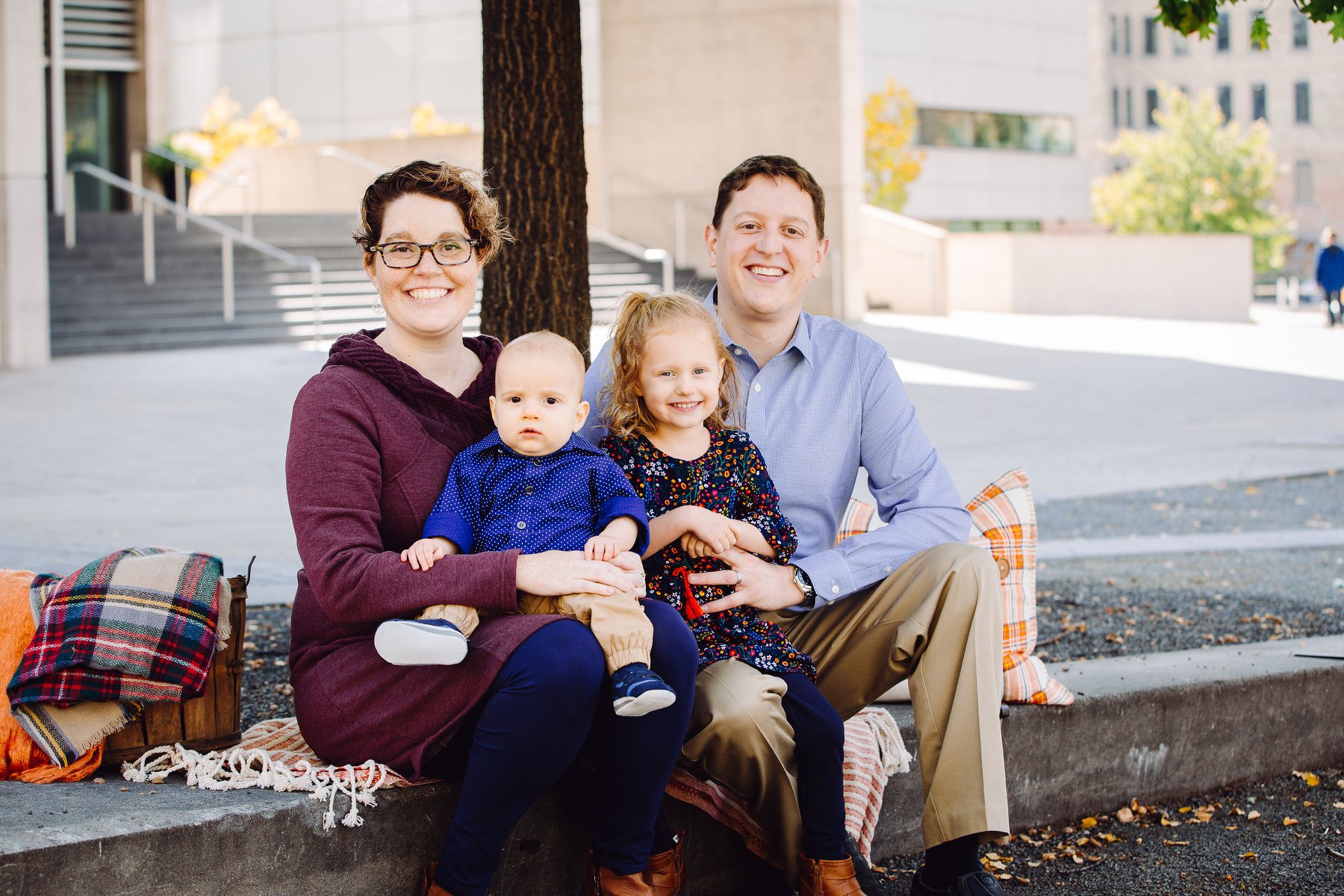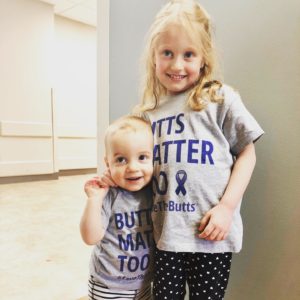
 Chelsea Boet is a primary care physician. She knew about colorectal cancer, having had patients walking through her door after being diagnosed. “Screening is what I do.” She had had a couple of young patients diagnosed in the 20 to 30-age range, but thought they were rare cases. Never did she think that it common in young people or that it could happen to her. It wasn’t until she started feeling symptoms herself that she discovered colon cancer in young adults was on the rise.
Chelsea Boet is a primary care physician. She knew about colorectal cancer, having had patients walking through her door after being diagnosed. “Screening is what I do.” She had had a couple of young patients diagnosed in the 20 to 30-age range, but thought they were rare cases. Never did she think that it common in young people or that it could happen to her. It wasn’t until she started feeling symptoms herself that she discovered colon cancer in young adults was on the rise.
Early in the third trimester of her second pregnancy, Chelsea experienced strange symptoms and knew something was wrong. She had some bleeding, cramping, and difficulty going to the bathroom. She talked to her OBGYN. “I was not examined and was told it was hemorrhoids. I had had a hemorrhoid. I knew this wasn’t hemorrhoids.” She was prescribed Zoloft for her anxiety and was assured it was nothing to worry about.
At her six-week postpartum visit, Chelsea was having abdominal pains and still experiencing symptoms. A colonoscopy “down the road” was recommended, an  ultrasound in the meantime, showed massive tumors in her liver. She didn’t have the chance to have a colonoscopy. She couldn’t believe it and was in complete denial. Chelsea thought they were probably adenomas and that she was only stage II, which would be very treatable and everything would be fine.
ultrasound in the meantime, showed massive tumors in her liver. She didn’t have the chance to have a colonoscopy. She couldn’t believe it and was in complete denial. Chelsea thought they were probably adenomas and that she was only stage II, which would be very treatable and everything would be fine.
While sitting in her surgical oncologist’s office, holding her 8-week old son in her lap, she was told it was stage IV colon cancer, her daughter had just turned three. “I just broke and remember thinking, ‘No, pick something else. It can’t be this. Pick something else.’” Because she recognized these symptoms, Chelsea wasn’t completely surprised by the diagnosis, but the stage IV diagnosis was devastating.
“I immediately thought I was going to die. I thought about my kids, my husband, and thinking, ‘No, I can’t have stage IV, because people die from stage IV.” She learned quickly that there was hope and it was treatable. There are aggressive ways to stop and treat stage IV cancers. “There is a good chance I could come out on the other side of this.”
 Chelsea’s strong family history has slowly revealed itself after her diagnosis. All on her maternal side. Her second cousin Audrey had stage IV colon cancer, an aunt had been diagnosed at stage III, both at age 40. Her grandma, who is in her 80s, has had tubular adenomas since she was 40 and had been having colonoscopies every three years. Chelsea’s great-aunt, her grandma’s sister, the mother of her second cousin, also had tubular adenomas for many years. Her grandma’s and great-aunt’s brother had stage I colon cancer. Chelsea’s two sisters and her brother all had a colonoscopy immediately after her diagnosis. Fortunately their results were all clear.
Chelsea’s strong family history has slowly revealed itself after her diagnosis. All on her maternal side. Her second cousin Audrey had stage IV colon cancer, an aunt had been diagnosed at stage III, both at age 40. Her grandma, who is in her 80s, has had tubular adenomas since she was 40 and had been having colonoscopies every three years. Chelsea’s great-aunt, her grandma’s sister, the mother of her second cousin, also had tubular adenomas for many years. Her grandma’s and great-aunt’s brother had stage I colon cancer. Chelsea’s two sisters and her brother all had a colonoscopy immediately after her diagnosis. Fortunately their results were all clear.
Besides making sure her patients are aware and educated on early screening, Chelsea makes sure to tell her story to others who are unsure or unfamiliar with colonoscopies. Emphasizing polyps and family history, she wants others to know that catching and removing polyps early is easier than dealing with chemotherapy, radiation, and constant surgeries. “Everyone has something specific that is keeping them from a colonoscopy. Some don’t want to know that they have cancer, and they’d rather die of the cancer. They find out too late and don’t want to treat it. Why? Is it anesthesia? Have you heard bad stories?”
She has spoken at conferences about enhancing primary physicians’ roles on working more on screening for colon cancer. She also wants to make other primary physicians become active in asking about family history, history of and  screening for polyps, and how physicians can do better.
screening for polyps, and how physicians can do better.
“If there is cancer and it was caught early, and it can be cured from surgery, wouldn’t you want to just be cured? That’s what the colonoscopy is doing. It’s giving you the chance to cure before bad stuff happens. Our goal is to find it at stage I, or II, and not have to talk about chemotherapy or radiation. We just take it out and call it a day. Patients don’t realize that that’s what colonoscopies do for them. If you find a polyp at stage I, it’s over, we just prevented cancer.”
Chelsea is still going strong and continues chemotherapy after liver and colon resection surgery in May. Complications following surgery and re-occurrence in her liver, ovaries, and lungs got her down, but she’s not giving up. She’s working hard to educate her community.
 After realizing there was not a specific event in town focused on education and awareness of colon cancer, she spearheaded the first Get Your Rear in Gear – Grand Rapids event, inviting the community to come together and learn. “It’s really exciting to see everything coming together. A lot of people are going to learn a lot about screening and access for those who didn’t have access before. I think we’re going to save lives. Slowly, but surely, through screening and education.”
After realizing there was not a specific event in town focused on education and awareness of colon cancer, she spearheaded the first Get Your Rear in Gear – Grand Rapids event, inviting the community to come together and learn. “It’s really exciting to see everything coming together. A lot of people are going to learn a lot about screening and access for those who didn’t have access before. I think we’re going to save lives. Slowly, but surely, through screening and education.”
